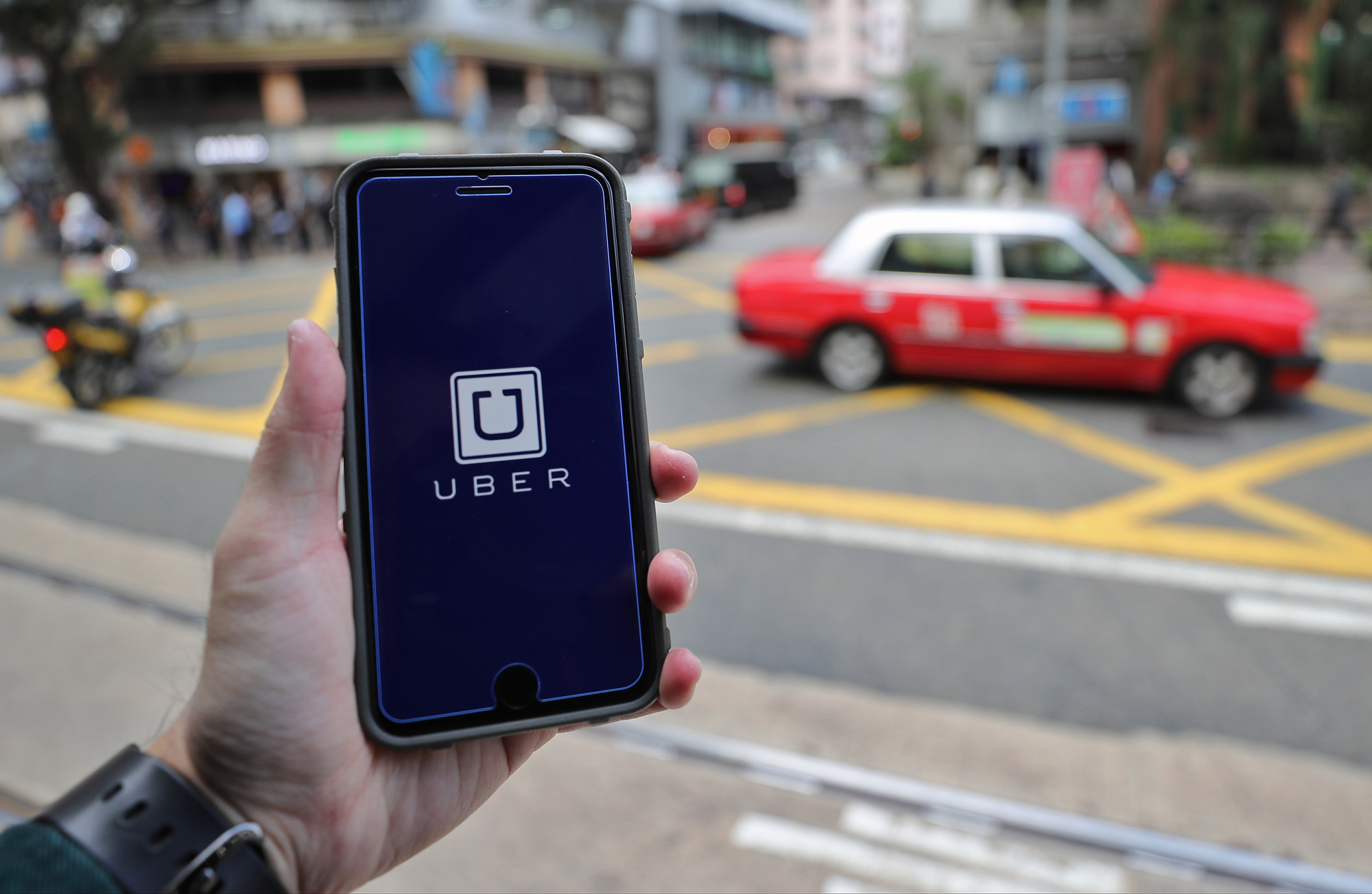
Hong Kong taxi drivers losing out to Uber? ‘If you can’t beat them, join them’, don’t go on sting operations, experts say
- Lawmaker Michael Tien tells cabbies to consider signing up to Uber Taxi service, says some earn HK$10,000 a month extra
- But legal framework needs attention, other legislators say, with one suggesting authorities buy back all taxi licenses in HK$5 billion overhaul
He said about 11,000 of the 16,000 urban taxis in the city were already on the platform, adding that some were earning an extra HK$10,000 (US$1,300) in monthly income, according to his understanding.
Much like the company’s regular service, Uber Taxi allows passengers to book rides directly with an upfront price instead of using a meter.
“The complaints were made by those who did not join. To me, if you can’t beat them, join them. If all the drivers join Uber Taxi and it turns out the demand is larger than the supply, the government should grant more hire-car permits,” Tien said.
“If their idle time has not reduced after they join, then I agree to outlaw Uber private cars. It is just a very simple concept to tackle the situation.”
Tien also said the government should help reduce the time taxis spent idle.
The battle between the US-based platform and Hong Kong taxis has been back in the spotlight after cabbies went “undercover” as passengers to conduct sting operations against Uber drivers in a bid to force authorities to crack down on those illegally offering ride-hailing services.
More than 216,000 drivers were registered on Uber and Uber Taxi by 2021, according to the latest available data from the company. There are 46,000 taxi drivers in the city at present.
The Law Reform Commission of Hong Kong, which is responsible for reforming various aspects of the city’s laws, conducted a study in 2018 on a proposal to regulate ride-hailing services with innovation-friendly legislation.
Referring to overseas experiences, the commission said such a regulatory regime should take into account passenger safety and include efforts to minimise the impact on taxi licence owners, background and health reports of drivers, as well as a system of checks and balances for service quality.
Lawmaker Doreen Kong Yuk-foon said the conflicts between the ride-hailing giant and the taxi industry underscored an imbalance in the interests of the stakeholders that needed to be addressed.
She said the government should buy back all taxi licences, worth about HK$5 billion (US$640.8 million), and launch a new system to grant car-hire permits to both taxis and ride-hailing vehicles to expand the market.
“Both taxi owners and ride-hailing platforms are vampires that suck all the blood out of drivers, who pay rent and commissions. By buying back all the taxi licences, cabbies and ride-hailing drivers only need to pay money to one party, which creates a more fair battleground,” Kong said.
“By doing so, the government can also regulate the ride-hailing platforms by setting rules on cars and drivers, as well as generating income by taxing those platforms which partner with cabbies or private car drivers.”

But Ronny Tong Ka-wah, a member of the key decision-making Executive Council, said the stand-off could not be resolved easily because of the present legal position.
“Under Hong Kong’s laws, any vehicle that charges fares must have a permit. The second obstacle is that if you are transporting passengers for a fee, your third-party insurance coverage becomes invalid as it is illegal to operate,” Tong said.
He added that Uber had the option to apply for permits, but chose not to do so as its operating model was not based on a licensing framework.
Uber neither owns nor hires drivers but acts as a matching service between drivers and passengers.
Lawmaker Johnny Ng Kit-chong said the city could learn from other jurisdictions which imposed taxes or fees on Uber-like services and set up funds to subsidise licensed taxis.
US-based Uber reached a legal settlement in Australia earlier this month, agreeing to pay A$271.8 million (US$181.2 million) to resolve a class action filed by the country’s taxi operators and drivers over the company’s entry into the market in 2012 that had resulted in a loss of income for the traditional players in the industry.
Australia’s laws were changed in 2015 to allow the company to operate without taxi licences, with state governments setting up compensation schemes for licence owners and cabbies.
Lawyer Eric Chan Pak-ho, who runs CPH Legal, said the government needed to ease its criteria for hire-car permits if it wanted to clear the path for Uber to operate legally in the city.
The solicitor said the present requirements for securing a permit were “very stringent”.
He added that limousines were the only category of vehicle that could obtain a permit.
Uber dominates the global ride-hailing market and operates in more than 90 countries. The similar Didi Chuxing service leads in mainland China with a user base of 580 million by 2021.
Grab is the top ride-hailing platform in Southeast Asia, offering transport, food delivery and electronic payment in markets such as Singapore and Thailand.
Additional reporting by Jess Ma

